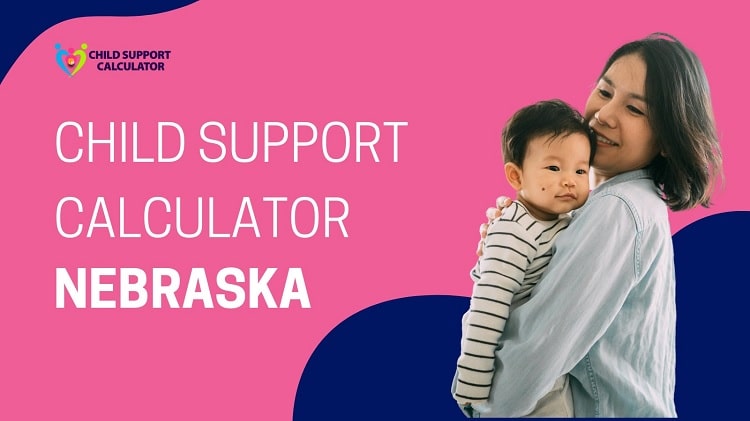Nebraska Child Support Calculator (Ne) | Guidelines – 2024
Child support is a recurring payment made by parents to assist with the cost of parenting a child. In Nebraska, both parents have a financial and non-financial responsibility to support their children. Child support payments calculated by the Nebraska Child Support Calculator are usually paid to the parent who spends the most time with the child (known as the custodial parent).

This is due to the fact that the law believes the custodial parent already spends money on the child. The parent who has less parental responsibility (known as the non-custodial parent) is normally the one who pays child support, but a court might order either parent to pay.
Typically, parents are responsible for paying child support until their child reaches the age of 19. The sum of these contributions is determined by the child support guidelines in Nebraska. The standards for determining child support are outlined in these guidelines.
They are mostly determined by the number of children in need of support. If a judge permits, the parents might agree to pay an amount that differs from the guidelines’ criteria. Similarly, if specific exclusions exist, a judge may alter the amount of support.
How To Calculate Child Support in Nebraska
The Nebraska courts have created a Basic Net Income and Support Calculation Worksheet to assist you in estimating your fair share of support (or Worksheet 1) using the Nebraska Child Support Calculator. However, before you can utilize it, you will have to do some investigation to figure out what the parents’ total net income is.
Gross income is reduced by deductions such as state and federal income taxes, mandated retirement contributions, and child support previously paid. You can also deduct the devaluation of required assets if you operate a business or farm. The blended net income is just the sum of both parents’ net incomes.
On the other hand, gross income encompasses everything from wages and incentives to unemployment and social security payments. Most other types of income, including regular overtime and spousal support (alimony), are also considered income. Actual child and spousal support payments, as well as money from necessarily implies public assistance programs, might be excluded.
A parent who attempts to avoid paying child support by refusing to work or working part-time is unlikely to succeed. A court can impute income, which means that it can determine how much this parent should be earning based on variables such as career history, education, and training. The state’s goal is to hold a slacker parent accountable to his or her family, not to penalize a stay-at-home parent with small children.
Table 1 (Income Shares Formula) shows the basic amount of child support required once you’ve calculated the parents’ total net income. Based on their individual income, each parent receives a proportionate part of this sum.
In addition to the standard assistance, one or both parents are responsible for the child’s health insurance and daycare expenditures, as well as additional expenses such as transportation and schooling.
You may need to take extra procedures to determine your child support payment depending on parenting time. Use Worksheet 2 if the parents have shared custody, which means one kid resides with one parent and the other with the other. Use Worksheet 3 if the parents have joint physical custody and the child spends equal coverage with each parent.
You might also find additional worksheets useful. Here are the links to Worksheet 4 (Number of Children Calculation), Worksheet 5 (Child Support Guidelines Deviations), and Worksheet 6 (Child Support Guidelines Deviations) (Imputation of child care tax credit).
Modifying Child Support in Nebraska
A child support order isn’t always fixed in stone once it’s been issued. After three months of suffering a major change in financial circumstances, a parent might request to amend (or change) the order. This parent must also anticipate that the new situation will last for another six months.
A major change in circumstances occurs when the amount of child support due changes by 10% or more, but not less than $25, depending on the application of the standards. When a parent loses a job, earns less or more money, or has a shift in a parental time-share, these are all typical causes for changing support. Other valid reasons to change a child support arrangement include the birth of a second child or the loss or acquisition of health benefits.
Adjusting Child Support Payments
Although a court assumes that the figure provided by the guidelines is the correct amount of child support, the outcome might sometimes be unjust. Parents can seek the court to increase or decrease the amount before the order is in effect depending on the aforementioned circumstances:
- When either parent or child’s medical bills are extremely high.
- When the child has a disability.
- If the total net income per month surpasses $15,000.
- A child who has been placed in foster care.
- Perhaps it would be unreasonable or improper to apply the standards in a specific circumstance.
Perhaps it would be unreasonable or improper to apply the standards in a specific circumstance. When the parents’ total net income surpasses $20,000 per month, a court may award support based on the standards for the first $20,000 of income.
Then, if there are one to three children, 10% of any income above $20,000 goes for child support. When there are four children, the threshold increases to 12% of the increased income going to child support, it rises to 13% for children under the age of five and 14% for children under the age of six.
Enforcing Child Support Orders
If the non-custodial parent is not paying their court-ordered commitment, which is determined using the Nebraska Child Support Calculator, then CSE can assist in enforcing it. CSE can enforce child support obligations through a variety of methods, including:
- Tax returns from both the state and the federal government are being intercepted.
- Income withholding
- Reporting on credit
- Passports are being denied
- Driver’s licenses are being suspended.
- Enforced by the courts
Services Offered through the Nebraska Child Support Enforcement Department
If you meet the requirements for services from the Nebraska Child Support Enforcement (CSE) Department, you may be eligible for the following:
Locating Parents
If you are attempting to create a child support order but are unable to locate a non-custodial parent, CSE can help. CSE may be able to find a missing parent for child support purposes through new hire reports, IRS, credit records, and other types of data.
Establishing Paternity
If you want to find out if your child is yours, there are a few options in Nebraska:
- Parents can sign an Affirmation of Paternity form at the time of birth while still in the hospital.
- Through genetic testing
How are child support payments taxed in Nebraska?
According to IRS standards, child support recipients are not required to pay federal tax on their payments, and child support payers are not permitted to deduct their payments. This is in contrast to the federal taxation of alimony payments, which the receiver treats as taxable income and the payor deducts. Child support may be taxed differently under Nebraska law.
How does having shared custody of the child affect child support in Nebraska?
In circumstances when the custody agreement allows for joint or shared custody of a child between both parents, all states provide a mechanism of adjusting the amount of child support payable.
A shared custody arrangement can be used by the court supervising the child support order as a reason for a deviation from the state’s normal child support calculations, according to Nebraska law. This implies that if the non-custodial parent spends parenting time with the custodial parent, the judge may lower the amount of child support due to the non-custodial parent’s financial expenditures during their time with the kid.
How are extraordinary medical costs treated by child support in Nebraska?
Nebraska provides specific criteria for shaping a child’s unusual medical expenditures, which are different from and in addition to normal child support payments. Extraordinary medical expenditures are typically incurred as a result of illnesses, hospital visits, or expensive treatments such as braces.
Extraordinary medical expenditures are treated as a “required deduction” for basic child support in Nebraska. If the non-custodial parent pays child care costs, the share of the total monthly child care expenditures ascribed to the custodial spouse is taken from the non-custodial parent’s monthly child support contribution. In addition to the standard child support, if the custodial parent pays for child care, the non-custodial parent must pay their portion.
Faqs
How are child care costs treated by child support in Nebraska?
Nebraska has unique standards that treat child care expenditures separately from the ordinary costs of bringing up a child for the purposes of determining child support payments due to the high costs of child care for a single payment.
Does child support cover college education expenses in Nebraska?
While the state of Nebraska does not have an express mandate that college expenditures be funded by child support, both parties can voluntarily agree to support college fees, which is then legally enforceable.







